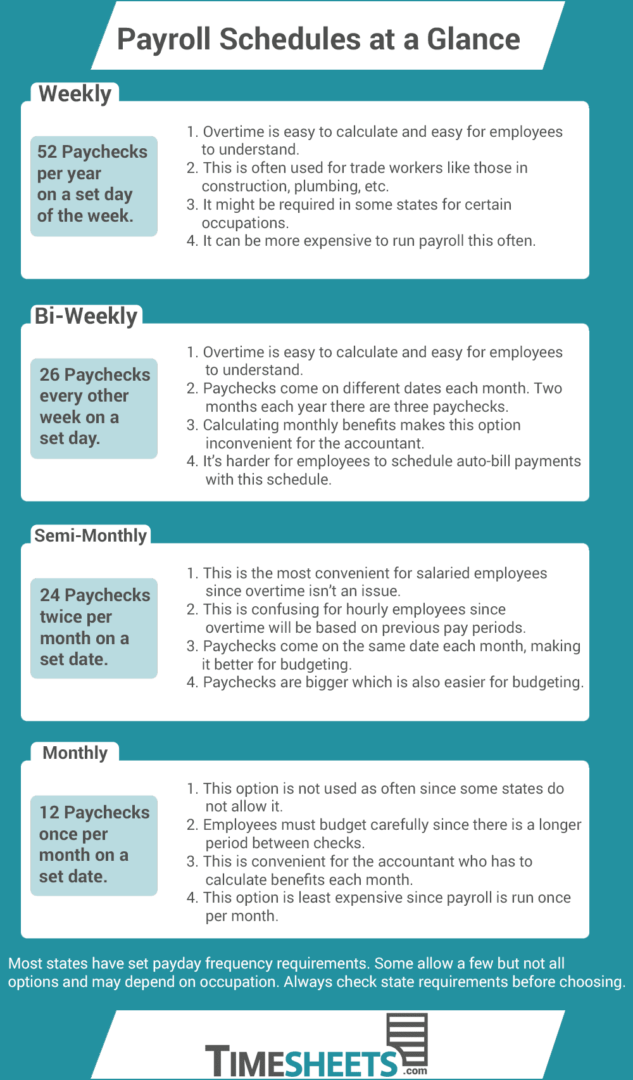Key Takeaways
1. Pay periods are set ranges of time that include all worked hours by an employee to be exported to payroll to be paid in the next pay cycle.
2. Although it is completely up to an employer when and how pay periods are implemented in their payroll, usually there are four different frequencies. These are: monthly pay period, bi-weekly pay period, semi-monthly pay period, and a weekly pay period schedule.
3. Deciding which pay cycle is best for any given company depends on factors related specifically to that business. Company owners will need to take into consideration how many employees they have on their payroll, their budgetary allowances, if employees are paid a salary or by the hour, and if there are different entitlements or employee benefits between each employee as payroll deductions.
4. Hiring a global PEO can help support your company to expand overseas to strategize and manage a successful global payroll implementation, which includes all different pay periods for your international workforce.
As part of running a company, one of the most important commitments you can make to your employees is paying them and doing so on time. This is because paying your employees on time, on a consistent schedule, is one sure-fire way to keep them happy during their time working with the company. Being paid on time also helps your employees budget their lives accordingly and to know in advance when their respective payday is. However, if you are looking to expand your team overseas, international payroll processing can become complicated very quickly [Read here to learn about international payroll processing]. This article will break down all there is to know about pay periods and go through some factors to help you decide the best pay period for your business.
What is a pay period?
Lawinsider defines a pay period as “that period of employment for which the employer customarily or regularly makes payments to employees for work performed or services rendered.” In other words, a pay period describes the frequency employees are paid. A pay period is also commonly referred to as a payroll period, pay schedule, or the payroll frequency.
Generally, a pay period will include a group of timesheets that are to be exported to payroll. In simpler terms, a range of hours the employee has worked, over a pre-defined period set by the employer, or the pay cycle.
The hours worked may be tracked manually through different payroll tracking systems or be based on an agreed-upon salary and hourly load at the start of their employment. In most cases, tracked hours may include a combination of both methods if an employee undertakes any overtime hours outside their standard hours.
In many countries, especially those with stringent labor laws, pay periods will be recorded on an employee’s pay stub otherwise known as a pay slip. The pay slip will usually be sent out by the company to the employee just before the payment of their wages. The pay slip will include a clear breakdown of hours worked and the amount of pay the employee is set to receive after taxes and benefits are factored in. It is important for international companies hiring foreign employees outside their local country, to check with the respective countries’ labor laws to meet compliancy requirements when setting up each employee’s pay role cycle, including details for pay slips.
What are the different types of pay periods?
Each country has different standards of what is considered a normal pay period schedule. This can range from monthly pay periods, bi-weekly pay periods, semi-weekly pay periods, or weekly pay schedules. The following will go through what each period means for a company.
1. Monthly
The monthly pay period is just how it sounds, employees will receive their pay once a month. This works out to be 12 pay cycles per year. The time of the month that payment is made is completely dependent on the company but should be the same date each month for consistency. Monthly payments are popular with companies because it is more convenient to just organize one payment each month that includes all normal and overtime hours on each pay stub.
Under certain country labor laws, it’s even possible to be mandated by law or at the mercy of your competition, to pay additional months’ pay at the end of the year. You’ll find the 13th-month pay is mandated in some countries in Europe, Asia, South America, and Africa. It is not commonly seen in countries such as the United States, United Kingdom, or Australia. Be sure to check each relevant country’s laws and customs regarding this entitlement if hiring workers abroad.
2. Bi-weekly
A company with a bi-weekly pay period means employees are paid every two weeks. Usually, there will be a specific set day every two weeks as the chosen day for payday. This set payday could be any day of the week in the bi-weekly schedule. For example, every second Thursday. Although the day will remain the same across the calendar year, the dates will change from month to month and year to year
3. Semi-monthly
Semi-monthly pay periods depend on how long each month is. Semi-monthly pay periods usually break down the month into two working blocks, the start of the month and the end of the month. For example, a start of the month pay cycle for the month of July could be from the 1st of July to the 15th of July inclusively, while the end of the month pay period will be July 16th to July 31st inclusively. In this example, the payday filing could be the 16th, and the 1st of the next month respectively. While for a month like February, the first pay period could be based on the 1st to the 14th of February, and the end encompassing the 15th to 28th of February. Regardless of the dates of the pay period, if a company implements a semi-monthly pay cycle, employees should expect to receive 24 pay slips a year.
4. Weekly
A weekly pay period means that employees will be paid every week, and usually on the same day. This means that for each year, an employee will receive 52 pay slips. Using a weekly pay period is popular with employees as they allow the employee to budget with more frequent payments, while not having to wait a long time for any worked overtime.
Video: How to Calculate Pay Period Earnings
Which is the best pay cycle for your business?
The first thing to know is that each business has full control over its payrolls. That is, how frequently and when an employee is to be paid. Despite this, some cycles are more suitable for some types of businesses than others. Here are a few factors that you will need to take into consideration when choosing the best pay cycle for your company.
- How many employees does a company has
- If there are collective bargaining agreements in place that specify a preference industry-wide
- Whether employees are paid a salary or by the hour
- Your budget for payroll processes
- If there are different payroll deductions for each employee across your workforce
Generally, the more frequent your payroll cycle is, the higher the costs. Therefore, working out your budget to cover your company’s payroll will influence which frequency is the best pay cycle for your business. If you’re a SaaS business, integrating SaaS spend management solutions can help optimize your budgeting processes, ensuring that payroll expenses are effectively managed regardless of the chosen pay cycle. Finally, which pay cycle a company chooses in their respective country can also be seen as a competitive factor in attracting prospective talent or keeping already engaged employees feeling secure.
Why it’s important to decide on a pay cycle and stick to it?
It’s always important to notify employees when pay schedules could be disrupted or delayed at the earliest convenience. Changing-pay days frequently, with no justification can cause unnecessary stress within the workplace and harm your employee’s well-being. One common reason why any of the above pay cycles could incur a delay would be public holidays falling on any scheduled payday. Some countries have rules about reporting changes in payroll schedules, especially if employees aren’t informed promptly of the change.

See each pay period schedule at a glance
Conclusion
If you are looking to touch down in a new foreign market by expanding your team to include employees that require different pay periods or pay cycles, a global PEO such as Horizons can help. Horizons are experts in hiring and managing different payroll schedules, no matter where you want to hire. Horizons and their easy-to-use payroll HR software will ensure you meet all compliance standards in any country you are looking to expand into. Whether you are looking to add foreign employees, contractors or freelancers to your payroll, Horizons have you covered. Contact us today to learn more.
Frequently asked questions
A pay period is a specified range of time that includes the tracked hours an employee works. The time range an employer chooses for their payroll can be on a monthly, bi-weekly, semi-monthly, or weekly pay schedule.
Although pay period and pay cycle have been used interchangeably, each phrase refers to a different thing within the payroll process. Essentially, these terms are used to support each other. A pay cycle is a frequency in which an employee gets paid, while the pay period is the time worked by an employee to be paid during the next pay cycle.















